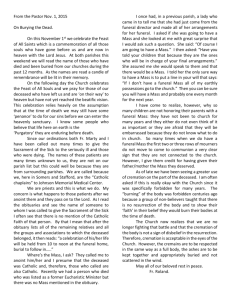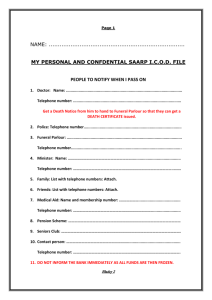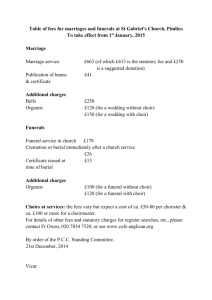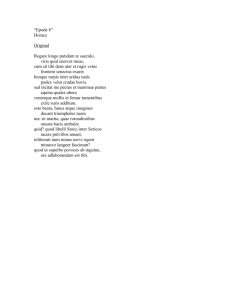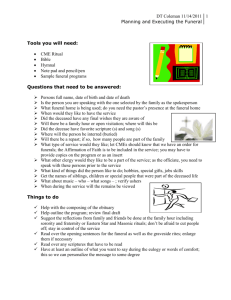Word Document - the catholic worker
advertisement
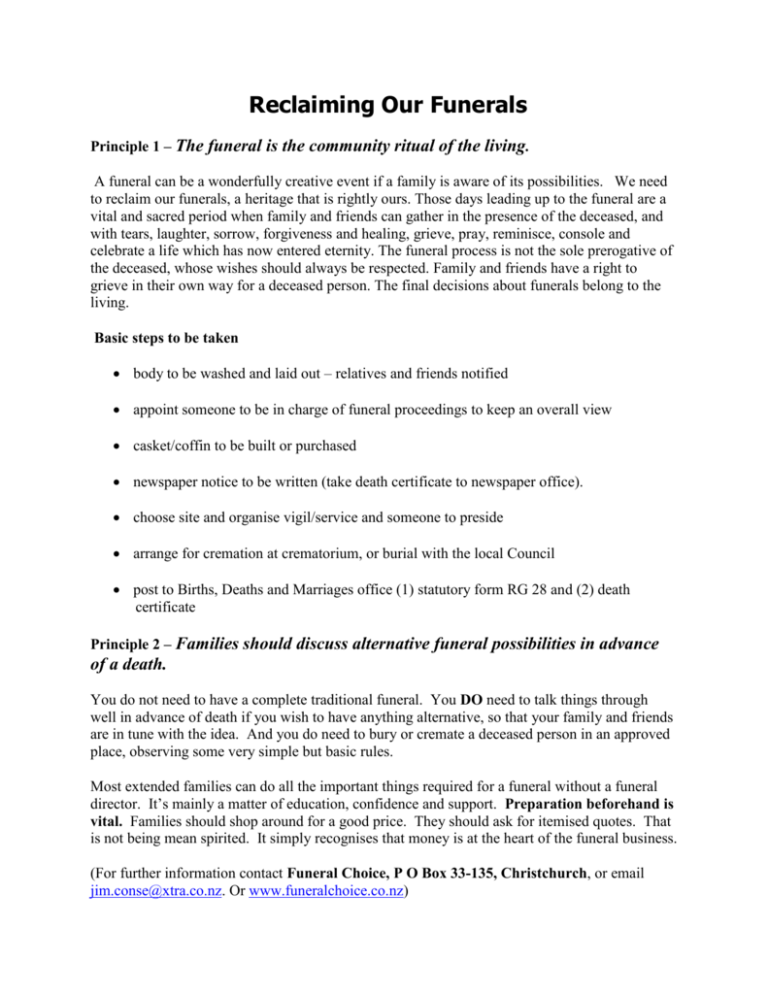
Reclaiming Our Funerals Principle 1 – The funeral is the community ritual of the living. A funeral can be a wonderfully creative event if a family is aware of its possibilities. We need to reclaim our funerals, a heritage that is rightly ours. Those days leading up to the funeral are a vital and sacred period when family and friends can gather in the presence of the deceased, and with tears, laughter, sorrow, forgiveness and healing, grieve, pray, reminisce, console and celebrate a life which has now entered eternity. The funeral process is not the sole prerogative of the deceased, whose wishes should always be respected. Family and friends have a right to grieve in their own way for a deceased person. The final decisions about funerals belong to the living. Basic steps to be taken body to be washed and laid out – relatives and friends notified appoint someone to be in charge of funeral proceedings to keep an overall view casket/coffin to be built or purchased newspaper notice to be written (take death certificate to newspaper office). choose site and organise vigil/service and someone to preside arrange for cremation at crematorium, or burial with the local Council post to Births, Deaths and Marriages office (1) statutory form RG 28 and (2) death certificate Principle 2 – Families should discuss alternative funeral possibilities in advance of a death. You do not need to have a complete traditional funeral. You DO need to talk things through well in advance of death if you wish to have anything alternative, so that your family and friends are in tune with the idea. And you do need to bury or cremate a deceased person in an approved place, observing some very simple but basic rules. Most extended families can do all the important things required for a funeral without a funeral director. It’s mainly a matter of education, confidence and support. Preparation beforehand is vital. Families should shop around for a good price. They should ask for itemised quotes. That is not being mean spirited. It simply recognises that money is at the heart of the funeral business. (For further information contact Funeral Choice, P O Box 33-135, Christchurch, or email jim.conse@xtra.co.nz. Or www.funeralchoice.co.nz) Who decides funeral arrangements? Funerals are conducted in order that the family and community might grieve properly and honour the dead. The family usually decides what form it will take. Sometimes this occurs in consultation with the deceased prior to death. Occasionally a conflict develops with what the deceased wanted/requested and what is appropriate for the family and community. While always being respectful of such requests, at times it can appropriate to ignore the decease’s requests. The funeral ritual belongs primarily to the living – it is the right and the rite of the living. Bringing the body home. It is a time-honoured tradition to bring the deceased either back home or to a family member’s home for the days prior to the funeral. Here people can gather freely and privately to express their grief, share their stories and honour the deceased. Often an informal vigil service is held in the home on the eve of the funeral. Stories can be told, songs sung, prayers said, honour paid. It creates a great opportunity for adults to grieve openly in their own time and for children to learn about death and dying in familiar surroundings. Embalming. Given the temperate weather of New Zealand, embalming is normally not necessary. A body will maintain reasonable condition for three to four days. However, should the weather be really hot or humid, embalming is an appropriate option. This can be done by a funeral director and should take no longer than two or three hours. There are also several modern-day reasons why embalming may be appropriate and they relate to hygiene. The threat of Hepatitis B and AIDS antibodies are removed upon embalming. Cancer victims often deteriorate quickly and embalming can be appropriate. Accident victims. You should be aware that victims of road, industrial and water accidents are often in a visually distressing condition. They can look awful. In such circumstances, a funeral director can be very helpful in preparing the body. The family may not always wish to see the deceased if the body has deteriorated or has been badly mutilated. Costs. Few adequate funerals are available for less than $6,000 and many cost well over $9,000. Yet funerals need not be so expensive. An all-up funeral could cost as little as the price of the burial plot ($828 or $1370 dug) or cremation fee ($700/800) if the family do the other services required. Depending on location, a full funeral could be kept as low as $1200/1500. Caskets/coffins. When purchased from an undertaker, caskets can range from $400 to $5,000, with $800 the average. Family members can make one. A simple home-made wooden casket made from customwood – pine or plywood - lined with linen/cotton and plastic (no PVCs for cremations) can be adequate. But you can order one from a funeral director. (Or in Christchurch you can order from mikefcoughlan@yahoo.com , phone 03 332 9192.) Autopsy. In the case of a sudden or unexplained death, an autopsy is required by law before cremation or burial is allowed to proceed. The police have to be notified. They refer it to the coroner. Wills. Every adult with disposable property should have a Will. It is complicated if you die without one. Funeral Grants : WINZ & ACC Assistance from Work and Income NZ may be available to assist toward the cost of a funeral. For an application form or copy of their pamphlets, free phone 0800 552 002 or visit their website www.workandincome.govt.nz .This grant may be available to the partner, child, parent or guardian of someone who has died to help towards the cost of the funeral. The grant of $1971.97 (as at 1 April 2013) is income and asset tested. For more information please cal free phone 0800 559 009. War funeral grants are available – apply to the War Pensions Unit free phone 0800 533 003. If ACC has accepted a claim, they can help pay for funeral costs.
